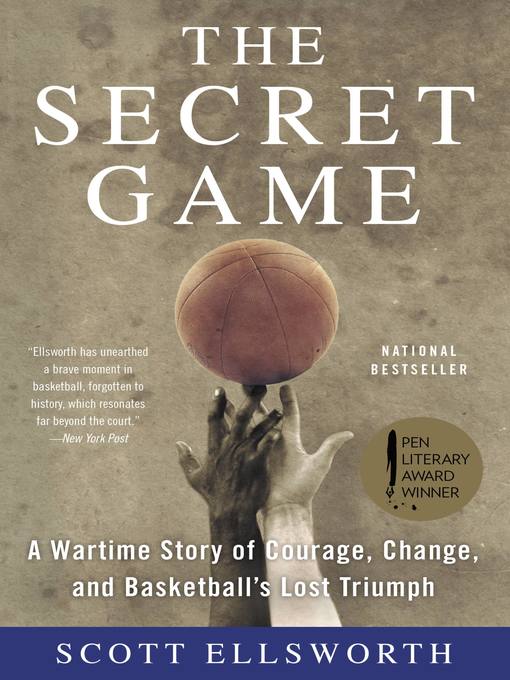
The Secret Game
A Wartime Story of Courage, Change, and Basketball's Lost Triumph
کتاب های مرتبط
- اطلاعات
- نقد و بررسی
- دیدگاه کاربران
نقد و بررسی

January 15, 2015
An account of a little-known basketball game in which the opponents played as much against Jim Crow as each other.One morning in March 1944 in the segregated South, an all-white team from the Duke University Medical School played an exhibition against the Eagles of the North Carolina College for Negroes. The game occurred in a mostly empty gym behind locked doors; even key school officials were left unawares. Most other facts about the game are less than clear, as no known documents survive. From the kindling of surviving participants' memories, Ellsworth (African-American History and African Studies/Univ. of Michigan; Death in a Promised Land: The Tulsa Race Riot of 1921, 1982) constructs a book heavy in historical context and biographical sketches but noticeably short on the particulars of the game referred to in the title. It's not the author's fault that the only reporter to witness the game tore up his notes or that the game registers and score sheets of Eagles coach John McLendon were lost by a former player. However, the brevity of the game account, which comes deep into a detail-laden narrative, would have benefited by greater disclosure of sources (it's not always enough to tuck a note at the back). In order to get to the game, readers must travel distant byways (overseas with James Naismith, for instance), as the author gives significant space to an assemblage of characters that aren't easily understood as significant. Many sports books bog down in play-by-play detail, but that's not the problem here. Even so, like many sports books, the prose contains heightened language-e.g., "a juggernaut of speed and finesse that left opponents demolished, referees exhausted, and fans in awe"-and mentions of "revolution" and a "new kind of basketball." Given the game's clandestine nature, there's little evidence that it changed societal perceptions. Again, no foul there. An intriguing sports tale more suited to a magazine piece than a book.
COPYRIGHT(2015) Kirkus Reviews, ALL RIGHTS RESERVED.

Starred review from February 15, 2015
In 1943, John McClendon, the last student of James Naismith, basketball's inventor, was the basketball coach at North Carolina College for Negroes in Durham. He was an innovative and aggressive coach who was changing the game on the fly with a fast break offense and pressing, athletic defense that foreshadowed modern basketball. Across town was Duke University, which boasted an ad hoc military team (all white, of course) from the Duke medical school. The team members were all former college stars and seemingly unbeatable. A challenge game was proposed between McClendon's black squad and the medical students. It couldn't be played openly in segregated North Carolina, so the two teams played in secret. Ellsworth, author of Death in a Promised Land (1982), about the 1921 Tulsa race riot, here tells another fascinating story of brave people chipping away at the seemingly insurmountable monoliths of segregation and Jim Crow. A historian with the soul of a poet, Ellsworth offers a remarkably nuanced, vibrant, and eloquent account of life in the South during WWII, and his portraits of the principal players in this secret drama are multitextured and complex.(Reprinted with permission of Booklist, copyright 2015, American Library Association.)

March 1, 2015
Duke history professor Ellsworth's first book in more than 30 years (Death in a Promised Land) tells the story behind the first racially integrated college basketball game in the American South, a secretly planned and played 1944 contest pitting the high-scoring, fast-breaking Eagles from the North Carolina College for Negroes (NCCN; now North Carolina Central University) against an all-white, geographically diverse military recruit squad from Duke School of Medicine. Ellsworth focuses on each of the various coaches, players, professors, and college administrators involved in this covert, dangerous, and historically significant matchup while framing their consistently fascinating profiles within the contexts of Southern racial prejudice in the World War II, pre-Civil Rights era and the rising popularity of basketball in gymnasiums across America. Innovative NCCN coach John McLendon and Duke's influential team leader David Hubbell feature prominently, but there are many other participants whose intertwined and impressively detailed biographies are woven into a compelling tale that is told in the author's impeccably clear prose. The first book-length story of the participants in this momentous event is similar in theme and tone to Peter McDaniel's Uneven Lies. VERDICT This thoroughly researched but accessible book is recommended to both sports fans and American history buffs. [See Prepub Alert, 9/29/14.]--Douglas King, Univ. of South Carolina Lib., Columbia
Copyright 2015 Library Journal, LLC Used with permission.

October 15, 2014
In 1943-44, the North Carolina College for Negroes had the country's highest-scoring college basketball team. Nearby Duke University's strongest squad was an all-white military team at the medical school, where the army and the navy had established wartime training programs. Plans were quietly made for an integrated game, remarkable in the South at the time and a historical moment finally getting its due. A professor in the Department of Afroamerican and African Studies at the University of Michigan, Ellsworth (Death in a Promised Land) received his PhD from Duke.
Copyright 2014 Library Journal, LLC Used with permission.

























دیدگاه کاربران